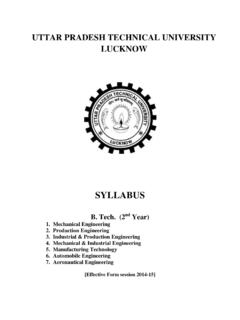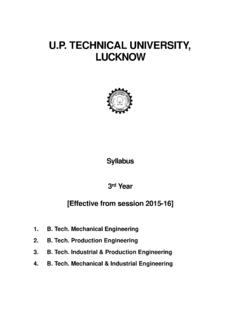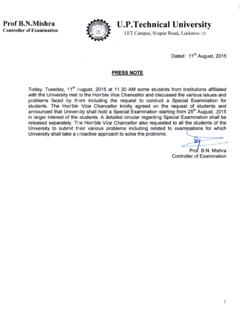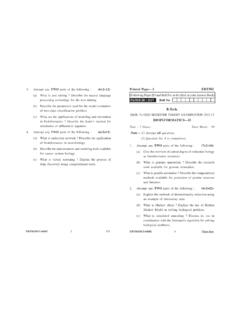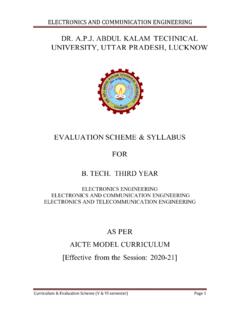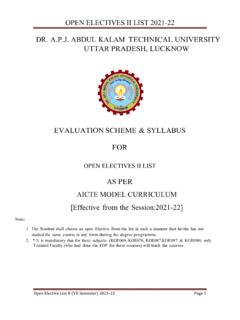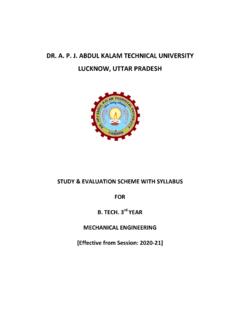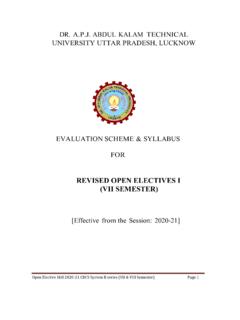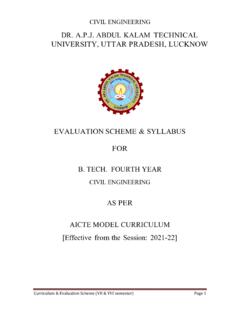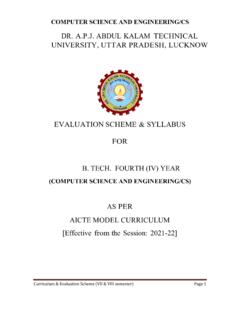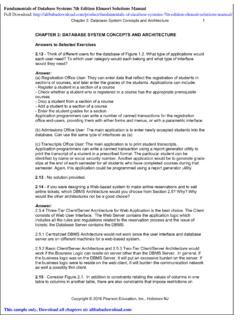Transcription of DR. A.P.J. ABDUL KALAM TECHNICAL UNIVERSITY LUCKNOW
1 DR. ABDUL KALAM TECHNICAL UNIVERSITY LUCKNOWEVALUATION SCHEME & SYLLABUS FORB. TECH. THIRD YEARC omputer ScienceComputer Engineering Computer Science and Engineering (Computer Science and Engineering/CS) On Choice Based Credit System (Effective from the Session: 2020-21) DR. ABDUL KALAM TECHNICAL UNIVERSITY ,UTTAR PRADESH, LUCKNOW Curriculum & Evaluation Scheme CS & CSE (V & VI semester) (COMPUTER SCIENCE & ENGINEERING/ COMPUTER SCIENCE)CURRICULUM STRUCTURE SEMESTER- V Sl. No. Subject Subject Periods Evaluation Scheme End Semester Total Credit Codes L T P CT TA Total PS TE PE 1 KCS501 Database Management System 3 1 0 30 20 50 100 150 4 2 KCS502 Compiler Design 3 1 0 30 20 50 100 150 4 3 KCS503 Design and Analysis of Algorithm 3 1 0 30 20 50 100 150 4 4 Deptt.
2 Elective-I Departmental Elective-I 3 0 0 30 20 50 100 150 3 5 Deptt. Elective-II Departmental Elective-II 3 0 0 30 20 50 100 150 3 6 KCS551 Database Management System Lab 0 0 2 25 25 50 1 7 KCS552 Compiler Design Lab 0 0 2 25 25 50 1 8 KCS553 Design and Analysis of Algorithm Lab 0 0 2 25 25 50 1 9 KCS554 Mini Project or Internship Assessment* 0 0 2 50 50 1 10 KNC501/KNC502 Constitution of India, Law and Engineering / Indian Tradition, Culture and Society2 0 0 15 10 25 50 11 MOOCs (Essential for Hons. Degree) Total 17 3 8 950 22 *The Mini Project or internship (4 weeks) conducted during summer break after IV semester and will be assessed duringV semester. Curriculum & Evaluation Scheme CS & CSE (V & VI semester)2 SEMESTER- VI Sl.
3 No. Subject Subject Periods Evaluation Scheme End Semester Total Credit Codes L T P CT TA Total PS TE PE 1 KCS601 Software Engineering 3 1 0 30 20 50 100 150 4 2 KCS602 Web Technology 3 1 0 30 20 50 100 150 4 3 KCS603 Computer Networks 3 1 0 30 20 50 100 150 4 4 Deptt. Elective-III Departmental Elective-III 3 0 0 30 20 50 100 150 3 5 Open Elective-I [Annexure - B(iv)] 3 0 0 30 20 50 100 150 3 6 KCS651 Software Engineering Lab 0 0 2 25 25 50 1 7 KCS652 Web Technology Lab 0 0 2 25 25 50 1 8 KCS653 Computer Networks Lab 0 0 2 25 25 50 1 9 KNC501/KNC502 Constitution of India, Law and Engineering / Indian Tradition, Culture and Society2 0 0 15 10 25 50 10 MOOCs (Essential for Hons. Degree) Total 0 3 6 900 21 Departmental Elective-I 1.
4 KCS-051 Data Analytics2. KCS-052 Web Designing3. KCS-053 Computer Graphics4. KCS-054 Object Oriented System DesignDepartmental Elective-II 1. KCS-055 Machine Learning Techniques2. KCS-056 Application of Soft Computing3. KCS-057 Augmented & Virtual Reality4. KCS-058 Human Computer InterfaceDepartmental Elective-III 1. KCS-061 Big Data2. KCS-062 Image Processing3. KCS-063 Real Time Systems4. KCS-064 Data CompressionCurriculum & Evaluation Scheme CS & CSE (V & VI semester) (CSE & CS)FIFTH SEMESTER (DETAILED SYLLABUS) Database Management System (KCS501) Course Outcome ( CO) Bloom s Knowledge Level (KL) At the end of course , the student will be able to: CO 1 Apply knowledge of database for real life applications.
5 K3 CO 2 Apply query processing techniques to automate the real time problems of databases. K3, K4 CO 3 Identify and solve the redundancy problem in database tables using normalization. K2, K3 CO 4 Understand the concepts of transactions, their processing so they will familiar with broad range of database management issues including data integrity, security and recovery. K2, K4 CO 5 Design, develop and implement a small database project using database tools. K3, K6 DETAILED SYLLABUS 3-1-0 Unit Topic Proposed Lecture I Introduction: Overview, Database System vs File System, Database System Concept and Architecture, Data Model Schema and Instances, Data Independence and Database Language and Interfaces, Data Definitions Language, DML, Overall Database Structure.
6 Data Modeling Using the Entity Relationship Model: ER Model Concepts, Notation for ER Diagram, Mapping Constraints, Keys, Concepts of Super Key, Candidate Key, Primary Key, Generalization, Aggregation, Reduction of an ER Diagrams to Tables, Extended ER Model, Relationship of Higher Degree. 08 II relational data Model and Language: relational Data Model Concepts, Integrity Constraints, Entity Integrity, Referential Integrity, Keys Constraints, Domain Constraints, relational algebra , relational calculus , Tuple and Domain calculus . Introduction on SQL: Characteristics of SQL, Advantage of SQL. SQl Data Type and Literals. Types of SQL Commands. SQL Operators and Their Procedure.
7 Tables, Views and Indexes. Queries and Sub Queries. Aggregate Functions. Insert, Update and Delete Operations, Joins, Unions, Intersection, Minus, Cursors, Triggers, Procedures in SQL/PL SQL 08 III Data Base Design & Normalization: Functional dependencies, normal forms, first, second, 8 third normal forms, BCNF, inclusion dependence, loss less join decompositions, normalization using FD, MVD, and JDs, alternative approaches to database design 08 IV Transaction Processing Concept: Transaction System, Testing of Serializability, Serializability of Schedules, Conflict & View Serializable Schedule, Recoverability, Recovery from Transaction Failures, Log Based Recovery, Checkpoints, Deadlock Handling.
8 Distributed Database: Distributed Data Storage, Concurrency Control, Directory System. 08 V Concurrency Control Techniques: Concurrency Control, Locking Techniques for Concurrency Control, Time Stamping Protocols for Concurrency Control, Validation Based Protocol, Multiple Granularity, Multi Version Schemes, Recovery with Concurrent Transaction, Case Study of Oracle. 08 Text books: , Silbertz, Sudarshan, Database Concepts , McGraw C J, An Introduction to Database Systems , Addision , Navathe, Fundamentals of Database Systems , Addision Neil, Databases, Elsevier "Database Management Systems",McGraw & Leon, Database Management Systems , Vikas Publishing C. Desai, An Introduction to Database Systems , Gagotia & Bhattacharya, Database Management System , TMHC urriculum & Evaluation Scheme CS & CSE (V & VI semester)4 Compiler Design (KCS-502) Course Outcome ( CO) Bloom s Knowledge Level (KL) At the end of course , the student will be able to: CO 1 Acquire knowledge of different phases and passes of the compiler and also able to use the compiler tools like LEX, YACC, etc.
9 Students will also be able to design different types of compiler tools to meet the requirements of the realistic constraints of compilers. K3, K6 CO 2 Understand the parser and its types Top-Down and Bottom-up parsers and construction of LL, SLR, CLR, and LALR parsing table. K2, K6 CO 3 Implement the compiler using syntax-directed translation method and get knowledge about the synthesized and inherited attributes. K4, K5 CO 4 Acquire knowledge about run time data structure like symbol table organization and different techniques used in that. K2, K3 CO 5 Understand the target machine s run time environment, its instruction set for code generation and techniques used for code optimization. K2, K4 DETAILED SYLLABUS 3-0-0 Unit Topic Proposed Lecture I Introduction to Compiler: Phases and passes, Bootstrapping, Finite state machines and regular expressions and their applications to lexical analysis, Optimization of DFA-Based Pattern Matchers implementation of lexical analyzers, lexical-analyzer generator, LEX compiler, Formal grammars and their application to syntax analysis, BNF notation, ambiguity, YACC.
10 The syntactic specification of programming languages: Context free grammars, derivation and parse trees, capabilities of CFG. 08 II Basic Parsing Techniques: Parsers, Shift reduce parsing, operator precedence parsing, top down parsing, predictive parsers Automatic Construction of efficient Parsers: LR parsers, the canonical Collection of LR(0) items, constructing SLR parsing tables, constructing Canonical LR parsing tables, Constructing LALR parsing tables, using ambiguous grammars, an automatic parser generator, implementation of LR parsing tables. 08 III Syntax-directed Translation: Syntax-directed Translation schemes, Implementation of Syntax-directed Translators, Intermediate code, postfix notation, Parse trees & syntax trees, three address code, quadruple & triples, translation of assignment statements, Boolean expressions, statements that alter the flow of control, postfix translation, translation with a top down parser.
